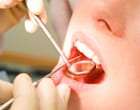 Just as common as snoring but not nearly as talked about, grinding your teeth in your sleep can have fairly serious repercussions and ought to be taken seriously. As the condition concerns your mouth, your dentist is able to help in diagnosing teeth grinding and then formulating an appropriate response.
Just as common as snoring but not nearly as talked about, grinding your teeth in your sleep can have fairly serious repercussions and ought to be taken seriously. As the condition concerns your mouth, your dentist is able to help in diagnosing teeth grinding and then formulating an appropriate response.
There seem to be two main causes of nocturnal teeth grinding (known clinically as bruxism). Often the condition is brought on by anxiety and, if your dentist believes this to be the case then you might be referred to a mental health specialist or counsellor. Of most concern to dentists is that bruxism can be brought on by a problem with the alignment of your teeth.
Bruxism can cause the teeth themselves to break down as they experience the constant pressure of being ground against one another, night after night. The enamel of teeth can wear away, leaving them more open to cavities. There is also a link with temporomandibular joint disorder (TMJ disorder), which affects the area where your jaw is joined to your skull.
The detrimental effects of nocturnal teeth grinding can easily be dealt with by your dentist fitting you with a mouth guard, designed especially for you by taking moulds of your teeth. This is worn during the night and cushions the impact of the teeth grinding against one another. Your dentist might determine that you need to have a brace fitted if the problem is with the alignment of your teeth.
Go and visit your City of Leeds dentist every six months for a check up and they may be able to spot the signs of bruxism so it can be dealt with.
Tags: bruxism, teeth grinding, tmj







